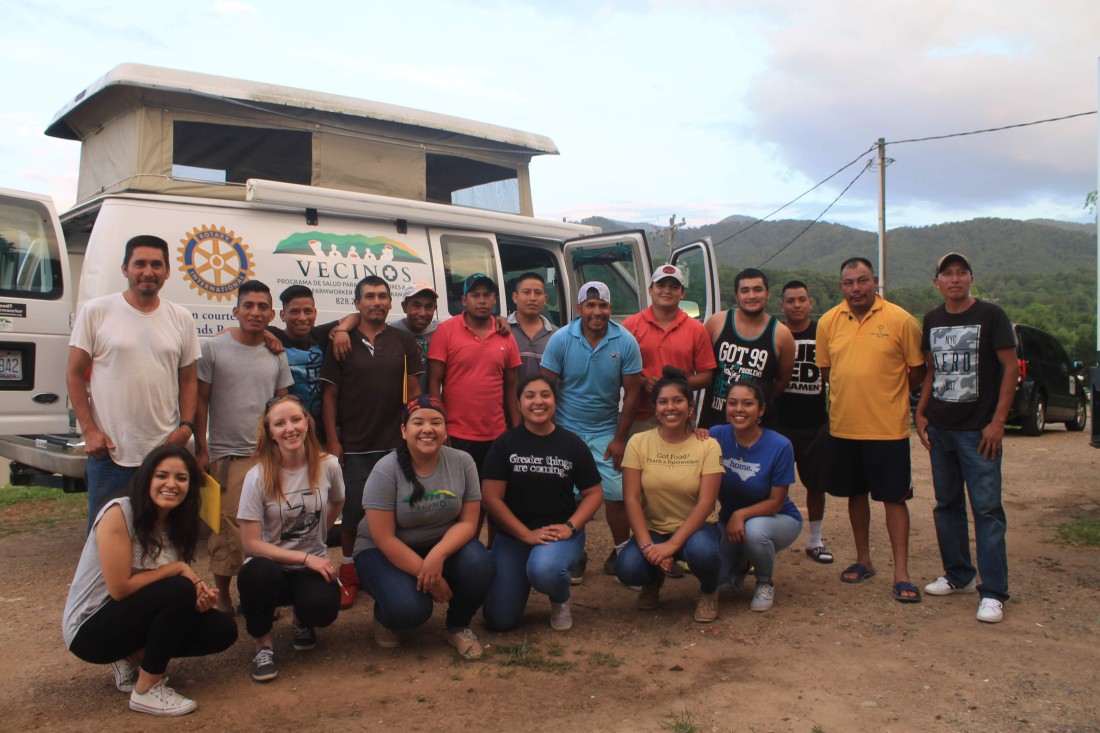Megan Padilla is sitting with her patient at a plastic folding table, nestled between two aging blue trailers. As the sun fades behind the hills, the only light comes from a battery-powered lamp and the sporadic glow of fireflies. The gentle chirp of crickets fills the night. Occasionally, an accordion wails from one of the trailers.
This is not the typical doctor’s office that Padilla, a certified nursing assistant, is used to. She takes the calloused hands of Servando, a migrant farmworker, in her own and gently pricks him, drawing blood.
Tonight, Padilla checks Servando’s blood sugar, hemoglobin levels and cholesterol. They discuss his health history and some pains he has been having and make plans for a future visit by a health care provider.

Wherever North Carolina consumers buy their fruits and vegetables — whether from Whole Foods, a farmers market or Ingles — chances are some of that produce passed through the hands of farmworkers like Servando. Living in dozens of camps scattered throughout the region, predominantly Latino farmworkers make up a largely invisible workforce that’s crucial to local agriculture.
Despite their importance to the region’s economy, these workers often labor in conditions that make obtaining health services difficult or impossible. Some dedicated advocacy organizations and health care providers fill the gap with mobile services that take care directly to farmworkers who would otherwise go without.
Powering local agriculture
The agriculture industry in North Carolina brings in over $70 billion each year, according to a 2015 report produced by N.C. State University. And with a severe and growing shortage of domestic workers willing to work in the fields, migrant farmworkers make up the backbone of the state’s industry. Some board buses in Mexico every year to toil in our fields from late spring through fall, while others, often undocumented, live here year-round. Each growing season, North Carolina is home to an estimated 80,000 of these farmworkers, although that number could be much higher.
Padilla is visiting a migrant farmworker camp in Rosman with an organization called Vecinos. The mission of Vecinos is in its name: Meaning ‘neighbors’ in Spanish, Vecinos serves the often-invisible neighbors that work to harvest the region’s food. Vecinos serves farmworker communities in eight WNC counties, providing health education, offering an on-site weekly clinic in Cullowhee and, during the busy growing season of May to November, deploying a fully functioning mobile clinic.
“We’re here to make sure that people can keep going to work the next day,” says Marianne Martinez, Vecinos’ executive director.
Farmworkers face unique health challenges. Exposure to dust and pollen can lead to vision problems. Musculoskeletal issues — the result of long hours spent standing or bent over — are common.
The biggest problem, says Martinez, is dental care, since workers often ignore concerns until they affect a person’s ability to work.
“It’s a challenge every day,” Servando says.
Vecinos works closely with the physical therapy and the nursing programs at Western Carolina University, as well as with other local clinics. Today, the staff of Vecinos is in Rosman to register new farmers, learn more about their health needs and provide health education. Later, Vecinos will return to this camp with a health provider and its mobile clinic.
Laboring under the law
Many farmworkers come to America legally through the H2A visa program, which allows growers to bring in foreign workers for temporary or seasonal work. The program was born out of mutual need: America requires agricultural workers to grow and harvest its crops, while foreign workers seek to earn money to support their families.
The roots of the program go back to 1942, when the nation faced labor shortages as American farmworkers left the fields to fight in World War II. In response, the ‘Bracero Program’ brought thousands of laborers from Mexico. In the decades since, Mexican workers have continued to cross the border, both legally and illegally, to work in North American fields and alleviate domestic labor shortages.
Under the H2A program, employers must first try to recruit Americans. Many farmers, however, find it difficult to hire Americans who are willing to work in farm conditions. In 2011, despite almost half a million unemployed North Carolinians, only 245 native-born residents signed on as farm laborers. Of those, only seven lasted to the end of the season.
In 2013-2014, the most recent season for which data is available, the U.S. Department of Labor estimated that 47 percent of farmworkers in America were undocumented; 22 percent of farmworkers were estimated to be working in the country legally, through programs like the H2A visa program that brought in workers like Servando.
The H2A affords agricultural workers protections that many undocumented workers don’t have. H2A workers are guaranteed housing and a minimum number of hours. If workers complete at least half a season, they are reimbursed for transportation. In addition, H2A workers are guaranteed a wage set by the Department of Labor. Set at a level designed to avoid driving down wages for domestic workers, the rate in North Carolina this year was set at $11.46 an hour.
However, these protections afforded to H2A workers could be at risk. The “Agricultural Guestworker Act” proposed by Rep. Goodlatte (R-Virginia) would eliminate the H2A visa program and replace it with a visa program called H2C. Under the proposed legislation, employers would no longer be required to provide housing or reimbursements for transportation, and wages would be calculated as a percentage of the minimum wage. Advocacy groups have criticized the bill, saying it would expose more workers to exploitative working conditions.
“The thinking is that … the workers are machines and they are here to be exploited,” Martinez explains. She notes that many of these measures are supported by large-scale agribusiness and that the small family farms that dominate Western North Carolina care about their farmworkers.
In short supply
Linda Andrews, national legislative director for NC Farm Bureau, says her organization advocates for a stable workforce on behalf of North Carolina farmers. “[Farmers have] expressed that there’s just a labor shortage now,” she explains, “and we’d like to be able to help move the needle to give them a workforce that brings stability so their industry can remain viable.”
Domestic workers “did not show interest” in farming in a period of high unemployment during the Great Recession, she says, and that state of affairs has only gotten more acute as the overall economy has improved.
Farm demand for workers using the H2A program rose in 2018, Andrews says, but there still aren’t enough workers to meet agricultural needs, especially for farms that operate year-round. Without a stable workforce, Andrews says, farmers are having to make hard decisions about the future. Such concerns “may hamper some expansion or the viability of a strong farm,” she says.
Indeed, both the number of farms and the amount of land used for farming in North Carolina have steadily and significantly declined in recent years, according to data from the U.S. Department of Agriculture.
Day in the life
Pablo came to America through the H2A program and is currently working at Norton Creek Farms, picking blackberries and strawberries. “In Mexico, it is bad because there is not much work, and if there is work, it is very little, and you don’t earn very much,” he says.

Despite earning a technical degree in computer systems and graphic design, for the past 10 years, Pablo has found himself boarding a bus in Guanajuato, Mexico. From Guanajuato, he rides 18 hours to the border. After crossing into the U.S., he travels another 32 hours to WNC. Like many of the other migrant workers at Norton Creek Farms, Pablo will move on to Georgia to pick onions after the berry season has ended here. When he returns to Mexico after the season is over, he will continue to work in agriculture as well as construction.
“It’s really difficult. Even though you have a specialty in something, it’s really hard to find a job sometimes,” Pablo explains.
The typical day at Norton Creek Farms starts around 4:30 in the morning. The farmworkers stop at the store for coffee and sweet bread and then get to work in the fields. Some days last 10 or 12 hours; some days, the workers are on the job only three or four hours.
“The most difficult thing is being separated from my family,” Pablo says.
The stress and anxiety of long days in the field and away from home and family can cause health problems, and educating workers about these issues makes up a significant portion of Vecinos’ work.
Outside of a farmworkers’ house in Franklin, Anna Ferretiz and Ashley Rodriguez talk with a group of farmworkers from Norton Creek Farms. They discuss topics like sun protection, healthy eating, strategies to cope with stress and depression, alcoholism and smoking.
Trust and consequences
Vecinos also provides legal advocacy and education. “Farmworkers, in general, have less rights than the average worker,” Martinez says. “It’s important for them to understand that you have the right to have drinking water, to have bathroom breaks, to have a washer, and it’s important that the grower complies with these rules.”
Recent raids and arrests by U.S. Immigration and Customs Enforcement agents in Henderson and Buncombe counties have set farmworkers’ nerves on edge. “A lot of our patients get scared,” says Jessica Rodriguez, lead outreach worker for Vecinos.
According to Martinez, attendance at Vecinos’ on-site clinic has been impacted because farmworkers are afraid to leave their homes to drive to seek health care.
An incident at Blue Ridge Health in Hendersonville illustrates the problem. Lee Homan, the clinic’s marketing and development coordinator, says Blue Ridge Health is the nation’s oldest migrant health center. According to Homan, an ICE vehicle pulled into Blue Ridge Health’s parking lot several months ago. While it wasn’t clear whether the vehicle was targeting the clinic or just happened to stop there, and agents left after a discussion with a health worker, the episode left clinic clients wary. In this small and tight-knit community, word spreads quickly, especially for the undocumented workers that are here year-round.
“There is a lot of fear about coming into the on-site clinic, which is why our mobile clinic is even more important now,” Martinez says.
To share sometimes-intimate health information, farmworkers must trust their providers. Over time, Vecinos staff members say, trust develops and relationships form. “They’re not only our patients — we’re familia,” Rodriguez says. Vecinos staffers bond with their clients over food, music and their shared connections to Mexico. “They know us; they know they can call on us for anything,” Martinez says.
For many Vecinos providers, the work is personal. Margarita Guerrero, who is completing a fellowship with Vecinos, says her family hails from the same region of Mexico as Pablo’s. Guerrero’s grandfather was part of the first generation of Mexican farmworkers who came to the U.S. as part of the Braceros program. Her uncles tended tobacco, zucchini and potatoes in North Carolina, and her father worked on poultry farms.
“Those farmworkers didn’t have programs like this,” she reflects. “Being a part of the farmworker movement is really rewarding. In a way, I’m honoring the hard work and sacrifices that my family has had to do. And I’m helping the people who are literally feeding us.”
Editor’s note: Though the farmworkers interviewed for this story say they are working legally in this country, Vecinos staff asked Xpress to use clients’ first names only.



Before you comment
The comments section is here to provide a platform for civil dialogue on the issues we face together as a local community. Xpress is committed to offering this platform for all voices, but when the tone of the discussion gets nasty or strays off topic, we believe many people choose not to participate. Xpress editors are determined to moderate comments to ensure a constructive interchange is maintained. All comments judged not to be in keeping with the spirit of civil discourse will be removed and repeat violators will be banned. See here for our terms of service. Thank you for being part of this effort to promote respectful discussion.